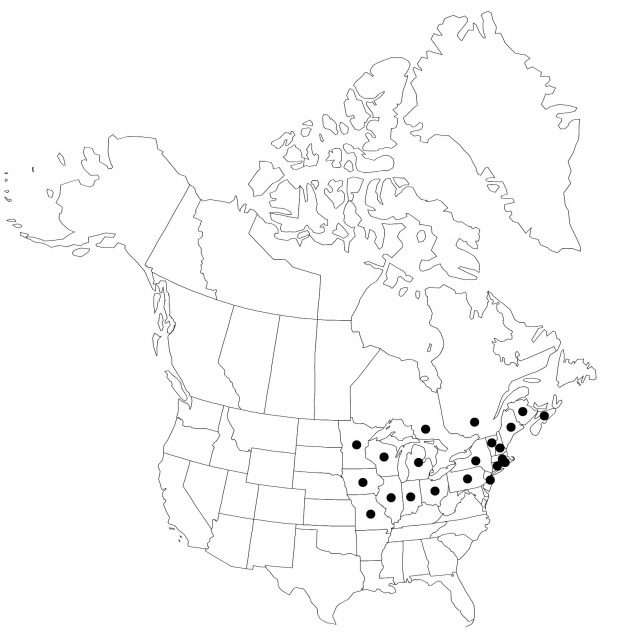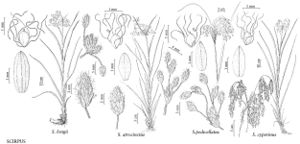Scirpus pedicellatus
Rhodora 2: 16. 1900.
Plants aggregated in dense tussocks; rhizomes branching, short, tough, fibrous. Culms: fertile ones upright or nearly so; nodes without axillary bulblets. Leaves ca. 8 per culm; sheaths of proximal leaves green or brownish; proximal sheaths and blades with septa few-to-many, consipuous or inconspicuous; blades 42–77 cm × 5–9 mm. Inflorescences terminal; rays ascending, scabrous throughout or main branches smooth proximally, rays rarely with axillary bulblets; bases of involucral-bracts green, brown, or blackish, not glutinous. Spikelets in open cymes, central spikelet of each cyme sessile, others usually pedicellate, spikelets ovoid, 3–9 × 2–3 mm; scales usually pale-brown, black pigment absent (or sometimes a little beside distal midrib), oblongelliptic, 1.4–1.8 mm, rounded or weakly mucronate, mucro (if present) to 0.1 mm. Flowers: perianth bristles persistent, 6, slender, contorted, much longer than achene, smooth, projecting beyond scales, mature inflorescence appearing woolly; styles 3-fid. Achenes whitish, elliptic or obovate in outline, plumply trigonous or planoconvex, 0.7–0.9 0.4–0.5 mm. 2n = 68.
Phenology: Fruiting summer (mid or late Jul).
Habitat: Usually in lowland marshes in stream valleys, edges of bogs, boggy meadows, and wet sandy shorelines
Elevation: 0–500 m
Distribution

N.B., N.S., Ont., Que., Conn., Ill., Ind., Iowa, Maine, Mass., Mich., Minn., Mo., N.H., N.J., N.Y., Ohio, Pa., R.I., Vt., Wis.
Discussion
Scirpus pedicellatus often hybridizes with S. cyperinus and forms hybrid swarms.
Selected References
None.
Lower Taxa
"shortened" is not a number.
